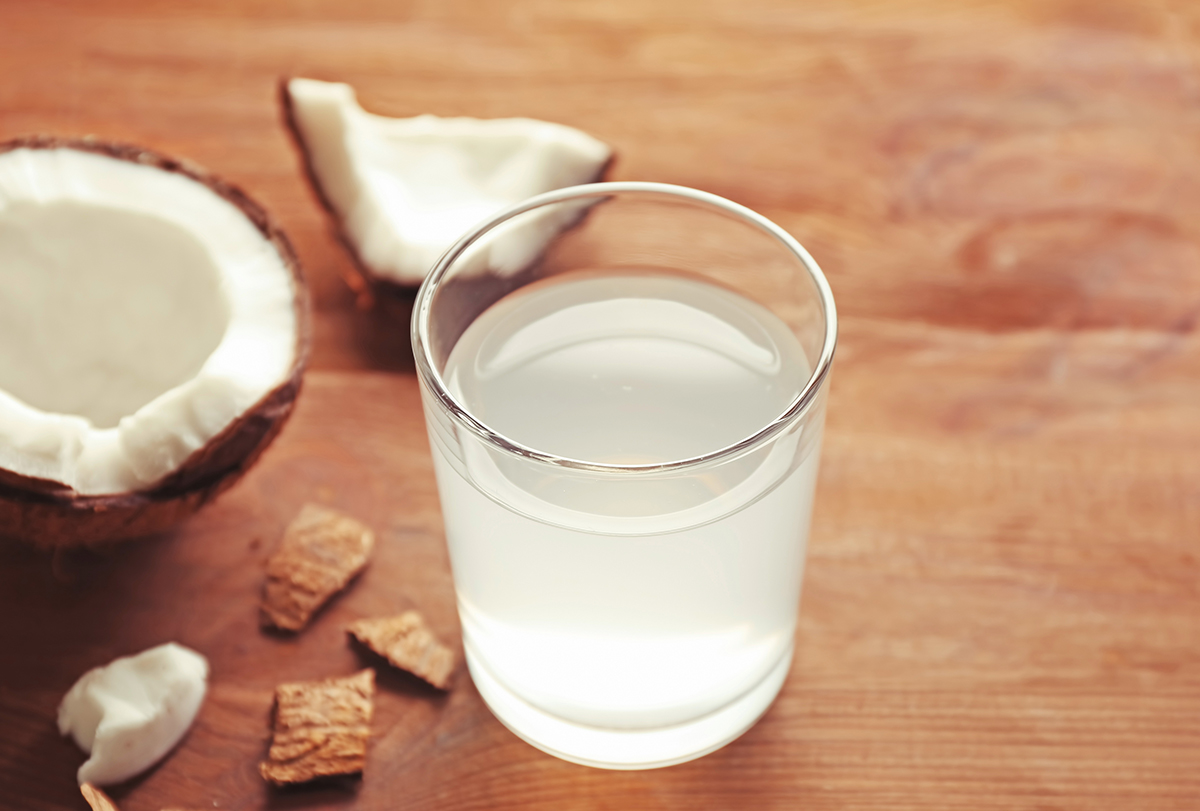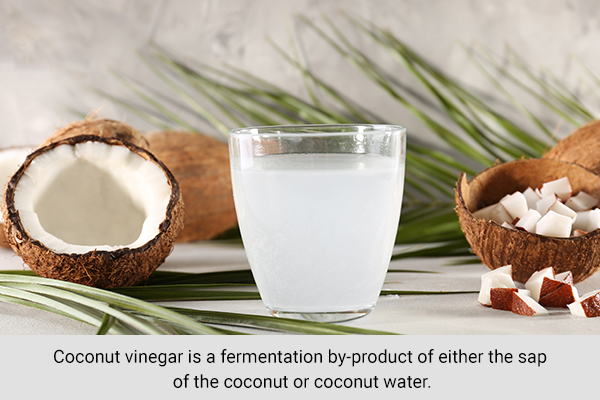In this article:
Apple cider vinegar is widely associated with a plethora of health benefits, but coconut vinegar is on the rise as an alternative to apple cider vinegar.

A product staple to the tropical countries of Asia for years, coconut vinegar is the new entrant in the US pantry. Coconut vinegar is sourced from the sap of the coconut flowers or diluted water of the matured fruits of the tree.
Proponents claim that coconut vinegar is endowed with a higher nutritional quotient than its apple-based equivalent. It is a source of probiotics, vitamins, and minerals.
Aside from its composition, coconut vinegar outshines apple cider vinegar in taste and acidity as well. It is a milder and much sweeter alternative, vying for the place of apple cider vinegar in our day-to-day lives.
Nutrient Content of Coconut Vinegar
Natural coconut vinegar has a fairly impressive nutritional profile. It contains vitamins and minerals including potassium, calcium, iron, magnesium, phosphorous, and sodium. It is also a source of antioxidants that may help lower the risk for certain cancers. (1)
Vinegar in various forms has been used for centuries, and some studies suggest that vinegar may provide various health benefits related to digestion, blood sugar control, and fighting infection. (1)(2)
Health Benefits of Coconut Vinegar
Listed below are some of the purported health benefits of coconut vinegar.
1. Positive effect on weight
Coconut vinegar is ideal for those who are looking out to lose weight.
A calorie-free and sugar-free option, coconut vinegar contains acetic acid that may help give you a feeling of fullness, stave off your appetite, and keep your blood sugar levels steady.
A 2009 study on obese Japanese men found those who consumed either 15 or 30 mL of vinegar per day had significantly lower body weight, waist circumference, and triglyceride levels than the placebo group after 12 weeks. (3)
A study published in Food & Nutrition Research in 2017 conducted on high-fat-diet-induced obese mice corroborated the use of coconut water vinegar in weight loss. The oral intake of coconut vinegar was shown to reduce body weight, fat-pad weight, and serum lipid profile. (4)
2. Fights infections

Coconut vinegar may help avert infections through its antifungal and antibacterial properties.
Being a fermentation product, coconut vinegar is a source of probiotics, which are beneficial microbes in the gut. This makes it a potential immune booster worth including in your diet. (5)(6)(7) Aside from its probiotic content, coconut vinegar contains potassium, zinc, calcium, and vitamin C. (1)
Similar to other vinegar varieties, coconut vinegar also has natural antimicrobial properties. This is accredited to its organic acid content, particularly acetic acid. (5)(1)(8)
Acetic acid can help stave off infections such as flu or colds by entering the membranes of microbes, thereby suppressing the growth of pathogenic bacteria. (5)
A study demonstrated the antimicrobial properties of rice vinegar against Escherichia coli on lettuce leaves. The researchers observed that a minimum acetic acid content of 5 percent in any vinegar can significantly reduce the levels of bacterial populations. (9)
Although further research is required to validate these claims, the infection-defying ability of coconut vinegar is similar to that of apple cider vinegar. Below is an example of how to enjoy coconut vinegar in your diet as a beverage.
How to use:
- Stir up a mix of 1 part coconut vinegar and 3 parts raw virgin honey.
- Dilute the mixture with 1 cup of water and drink it.
3. Provides essential amino acids
Coconut vinegar provides an array of amino acids, including nine essential and eight nonessential amino acids. Amino acids are the units that make up the structure of protein. (2)(10)
Besides serving as the structural components of proteins, amino acids have multipronged regulatory functions. These include mediating various metabolic pathways, helping in the synthesis of antibodies, oxygen-carrying hemoglobin, and acting as precursors to several hormones, nucleotides, and neurotransmitters. (11)
Amino acids contribute towards tissue repair as proteins, immune response as antibodies, metabolic functions as hormones, and transmission of messages within the brain as neurotransmitters.
How to use:
Drinking coconut vinegar can help you get a healthy supply of 17 amino acids in one shot.
4. Provides digestive comfort

Coconut vinegar provides enzymes, probiotics, and prebiotics that can help maintain the health of your stomach.
These constituents can help ease digestive discomforts by enhancing the absorption of nutrients, maintaining a balance of intestinal microflora, and thus helping in the digestive process. (6)(12)
Aside from benefiting the digestive process, the natural probiotics found in coconut vinegar can stimulate the nerves that control the movements in the gut.
Probiotics are known to fight off lactose intolerance, diarrhea, and irritable bowel syndrome (IBS). (13)
Those with heartburn or acid reflux issues should consult their doctor before adding vinegar to their diet. A common advice for digestive health is to take 15–30 mL of coconut vinegar with water before meals, but there is no concrete research supporting this claim.
5. Has a low glycemic index
Glycemic index is a parameter that evaluates foods on a score of 0 to 100 based on how slowly or quickly the blood sugar rises right after eating them.
Foods that have been assigned a low glycemic index are suggested for lowering the risk of type 2 diabetes and optimizing blood sugar regulation.
Coconut vinegar is one such option as it has a very low score of 35 on the glycemic index. Consuming coconut vinegar may help regulate blood sugar levels and, as some studies suggest, lower the risk of cardiovascular diseases. (5)(1)
According to a study published in Diabetes Care, vinegar can have a positive impact on postprandial insulin sensitivity on insulin-resistant subjects. (14)
6. Regulates blood pressure

Coconut vinegar is a source of the mineral potassium.
Potassium plays a crucial role in maintaining a balance of electrolytes and thus prevents a spike in blood pressure levels. It also encourages heart health by reducing the triglyceride levels in the blood. (5)(1)
While no individual study has researched coconut vinegar’s role, a study conducted on rats published in the Journal of Bioscience, Biotechnology, and Biochemistry has supported the administration of rice vinegar to hypertensive rats. The researchers observed that rice vinegar significantly reduced the blood pressure level in the experimental group. (15) However, more research is needed on humans.
How to use:
In a glass of water, add 3 teaspoons of coconut vinegar. Drizzle it with a little honey or add it to beverages.
Preparing Vinegar From Coconut Sap and Coconut Water

Coconut vinegar is a fermentation by-product of either the sap of the coconut or coconut water. The difference in nutritional value comes from the method of preparation, which relies on a different source to act as a starter.
Coconut vinegar prepared from the sap is 100 percent pure and far more nutritionally dense than the one prepared from coconut water. (16)
Although the preparation of coconut vinegar involves simple steps, it is a time-consuming method.
- Just before the coconut flowers bloom, the sap is collected.
- The sap is allowed to ferment for about 8 months to a year. After the stipulated time period, this fermented sap is collected as is.
The vinegar prepared from coconut water is tapped from mature coconuts. It is a diluted product prepared by adding ingredients such as apple cider vinegar or cane sugar. It is very easy to prepare coconut vinegar from coconut water at home.
- Using a sieve, strain the coconut water into a pan. Add sugar to it and let it dissolve completely. Boil this water at 65°C for 20 minutes.
- Once it cools down, pour it into a container. Add ½–1 teaspoon of yeast and mix it thoroughly. Set this mixture aside for 4–7 days in a sterilized airtight jar to allow the formation of vinegar.
- The final product can be harvested in as little time as 2 weeks.
How to Use Coconut Vinegar
Coconut vinegar can be used along the same lines as apple cider vinegar.
Including coconut vinegar in various ways in your diet can help you benefit from some of its suggested health claims.
- Use it as a dressing for your salads. You can add it to your usual yellow mustard and avocado dressings and dips.
- Add it to your marinades or creamy sauce preparations.
- Use it as a health tonic. Add 1 teaspoon of coconut vinegar to smoothies, tea, hot water, or fruit juices. This may help to balance your gut microbiome, as it is a source of probiotics.
- Alternatively, you can use coconut vinegar as a natural toner for your already cleansed skin. Add a few drops of the coconut vinegar to a cotton ball and dab it on your face. This will kill any bacteria on the skin and prevent acne.
Note: However, do not drink coconut vinegar straight as it can harm your esophagus and stain the enamel of your teeth. If you have any digestive issues, consult your physician before adding it to your diet. Add any vinegar gradually to your diet.
Final Word
Coconut vinegar is a vegan, gluten-free ingredient that you won’t regret adding to your kitchen cabinets. Look for coconut vinegar prepared from the sap when you go out to shop for the product. This is because it surpasses the nutritional content of coconut water-based vinegar.
Coconut vinegar offers a bevy of unique health benefits. However, consider taking your doctor’s approval if you are on medication or have a medical condition.
Also, keep in mind that adding one food to your diet can’t cover or make up for other unhealthy diet choices. Eating an overall healthy, varied diet is recommended for overall health.
- Was this article helpful?
- YES, THANKS!NOT REALLY


